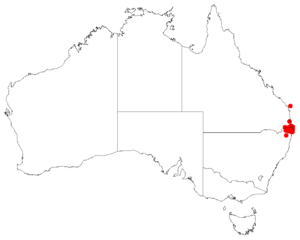Harpullia alata facts for kids
Quick facts for kids Harpullia alata |
|
|---|---|
| Scientific classification |
|
| Kingdom: | Plantae |
| Clade: | Tracheophytes |
| Clade: | Angiosperms |
| Clade: | Eudicots |
| Clade: | Rosids |
| Order: | Sapindales |
| Family: | Sapindaceae |
| Genus: | Harpullia |
| Species: |
H. alata
|
| Binomial name | |
| Harpullia alata |
|
 |
|
| Where the winged tulip grows in Australia | |
| Script error: The function "autoWithCaption" does not exist. | |
Script error: No such module "Check for conflicting parameters".
The Harpullia alata, also known as the winged tulip or wing-leaved tulip, is a type of tree. It belongs to the Sapindaceae family, which also includes plants like lychee and maple trees. This tree is native to eastern Australia. You can find it growing from Brisbane, Queensland, down to Grafton, New South Wales.
What Does the Winged Tulip Look Like?
The winged tulip tree can grow up to 7 meters (about 23 feet) tall. Most parts of the tree are smooth, except for its new shoots and flower clusters, which have tiny hairs.
Its leaves are quite unique. The main stem of each leaf, called the rachis, has wide, toothed (like a saw) wings. This leaf stem is about 11 to 18 cm long. It holds 6 to 12 smaller leaves called leaflets. Each leaflet is oval-shaped, 6 to 18 cm long and 2.5 to 7 cm wide. They sit on a small stalk that is 6 to 10.5 cm long.
The flowers of the winged tulip grow in clusters (called inflorescences). These clusters appear where the leaves meet the stem and are 5 to 14 cm long. Their stalks are covered in very short, soft hairs. The sepals (small, leaf-like parts that protect the flower bud) are about 7 mm long, and the petals are about 12 mm long.
Each flower has eight stamens, which are the parts that produce pollen. The ovary, where the seeds will form, is covered in short, soft hairs. The style, which is part of the female flower, is flat and bends backward. When the fruit develops, the sepals stay attached. Inside each part of the fruit, there are two seeds. These seeds are almost completely covered by a bright yellow to red aril, which is a fleshy covering.
This tree is special because it's the only Harpullia species in Australia with toothed edges on its leaflets and wings on its leaf stem.
Where Does the Winged Tulip Grow?
The winged tulip tree grows naturally in rainforests. It prefers these environments because they provide the right amount of moisture and shade.
How Was It Named?
Scientists officially named this tree in 1860. It was described by Ferdinand von Mueller, a botanist who worked for the Victorian government. He studied a sample of the tree that was collected by Dr. Hermann Beckler near the Clarence River in New South Wales.
The second part of its scientific name, alata, comes from a Latin word meaning "winged." This name was chosen because of the unique "wings" found on the tree's leaf stems.
 | Kyle Baker |
 | Joseph Yoakum |
 | Laura Wheeler Waring |
 | Henry Ossawa Tanner |

